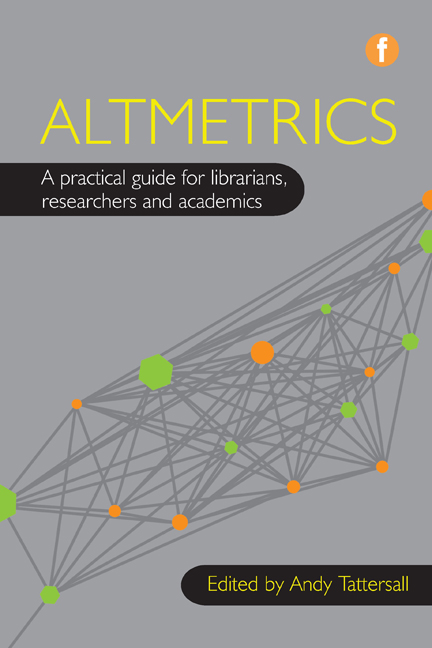Book contents
- Frontmatter
- Contents
- Contributors
- 1 Introduction
- 2 Road map: from Web 2.0 to altmetrics
- 3 ‘Metrics of the trade’: where have we come from?
- 4 The evolution of library metrics
- 5 The rise of altmetrics
- 6 Beyond bibliometrics: altmetrics reflects information about engagement with more types of scholarly content from more types of consumers
- 7 Considerations for implementing new technologies
- 8 Resources and tools
- 9 The connected academic: implementing altmetrics within your organization
- 10 Appmetrics: improving impact on the go
- 11 Open peer review
- 12 Conclusion
- Index
2 - Road map: from Web 2.0 to altmetrics
Published online by Cambridge University Press: 08 June 2018
- Frontmatter
- Contents
- Contributors
- 1 Introduction
- 2 Road map: from Web 2.0 to altmetrics
- 3 ‘Metrics of the trade’: where have we come from?
- 4 The evolution of library metrics
- 5 The rise of altmetrics
- 6 Beyond bibliometrics: altmetrics reflects information about engagement with more types of scholarly content from more types of consumers
- 7 Considerations for implementing new technologies
- 8 Resources and tools
- 9 The connected academic: implementing altmetrics within your organization
- 10 Appmetrics: improving impact on the go
- 11 Open peer review
- 12 Conclusion
- Index
Summary
Introduction
This chapter aims to give readers a better understanding of why altmetrics and other allied social media tools have evolved that have the potential to change academia, the library and information world. The purpose is to explain that this change has not happened overnight and that it is part of a much bigger shift that is taking place. During the decade 2005–15 Web 2.0 technologies have afforded academia several opportunities, and only now are we starting to take advantage of them. Much of the academic and library community has been slow to embrace technologies focused on scholarly communication and measurement. This chapter explains the continually evolving process, and that in reality there is still some way to go before we will see academics using what we would previously have referred to as Web 2.0 tools fluently in their workflow. The chapter explains how past and present technologies have developed and been exploited in the library community. Given the ascendency of social media and Web 2.0 in academia and libraries, it was only a matter of time before alternative metrics appeared, in whatever form.
The beginning of the web
For anyone under the age of 35 it is hard to imagine life without the internet, while anyone over that age who regularly uses it will probably feel that it has been around for most of their working life. This is testament to the impact and significance of such an invention; it has changed the world beyond recognition. We cannot touch it, smell it or taste it, yet the world wide web has become an essential part of billions of people's existence. Academia has been part of the web since day one; indeed it was a computer scientist, Sir Tim Berners-Lee, who put a proposal to his employers at CERN, the European Organization for Nuclear Research, for an information management system in 1989. Within the first few years of the web's existence various notable academic websites were established. These included the pre-print archive arXiv.org in 1991 and the bioinformatics resource portal ExPASy two years later.
- Type
- Chapter
- Information
- AltmetricsA practical guide for librarians, researchers and academics, pp. 11 - 20Publisher: FacetPrint publication year: 2016
- 1
- Cited by



